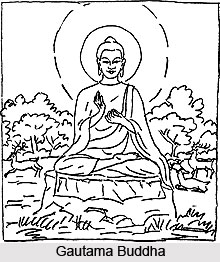 Cause of suffering has been mentioned in the Four Noble Truths of Buddhism. The four noble truths state that suffering exists and there is a cause of this suffering. Regarding the second question of the causes of suffering Buddhism has recourse to psychological analysis and metaphysical speculations. This is the noble truth of the origin of suffering. Verily it is the craving thirst that causes the renewal of becoming, that is accompanied by sensual delights, and seeks satisfaction, now here, now there - that is to say, the craving for the gratification of the senses, or the craving for prosperity. According to Buddhist philosophy, the attachment of human beings with life and its major mental problems like ignorance, attachment and anger are the causes of suffering as they cannot bring continuous happiness. It is further mentioned that anger is one of the principal reasons that create harm to other people and is also responsible for causing suffering.
Cause of suffering has been mentioned in the Four Noble Truths of Buddhism. The four noble truths state that suffering exists and there is a cause of this suffering. Regarding the second question of the causes of suffering Buddhism has recourse to psychological analysis and metaphysical speculations. This is the noble truth of the origin of suffering. Verily it is the craving thirst that causes the renewal of becoming, that is accompanied by sensual delights, and seeks satisfaction, now here, now there - that is to say, the craving for the gratification of the senses, or the craving for prosperity. According to Buddhist philosophy, the attachment of human beings with life and its major mental problems like ignorance, attachment and anger are the causes of suffering as they cannot bring continuous happiness. It is further mentioned that anger is one of the principal reasons that create harm to other people and is also responsible for causing suffering.
The Upanishads have already indicated the cause of suffering. To them the eternal is bliss and the transient painful. The eternal unchanging is the truth, freedom and happiness, but the world of birth, old age and death is subject to suffering. There is sorrow in the world because all things are transient. They vanish as soon as they occur. According to this noble truth there is no such thing as being possessed of being. It states that desires cause suffering, since human beings desire what is impermanent, changeable and perishable. It is the impermanence of the object of desire that causes disappointment and regret. All pleasures are transient. The fundamental proposition of the system that life is sorrow is dogmatically accepted from the Upanishads.
Buddha establishes that there is nothing permanent, and if only the permanent deserved to be called the self or Atman, then nothing on earth is self. All are impermanent, body, sensation, perception, and consciousness and all these are sorrows. They are all not-self. Nothing of them is substantial. They are appearances empty of substance or reality. Ignorance is the main cause out of which false desire springs. The empty and abstract form of false will is ignorance; while the concrete realisation of ignorance is false will. It is further mentioned that in practicality these two possess same meaning. To the Buddhist philosophers, as to the Indian thinkers in general, knowledge and will are so closely related that no distinction is drawn between them. They mention that ignorance of truth is the antecedent condition of all life.




















